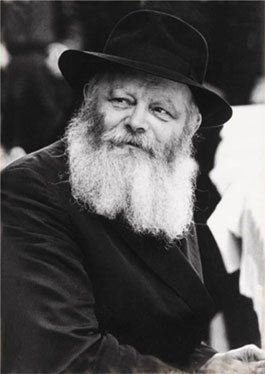
I’ve heard this story on the second day of Yom Tov (Wed.) from one of the rabbis in Brooklyn:
Every year, chassidim would wish the Rebbe that “the Rebbe should be alive next year”. To which he would respond: “gam atoh” (“you too”). One year, a chossid came to the Rebbe and wished/asked him that “the Rebbe should reveal himself”. Meaning, of course, that the Rebbe should reveal himself as [who he is]. To which the Rebbe responded: “gam atoh”.Those of understanding will understand.
This can be explained as follows. Every person has the deepest potential of who he is in the essence. The chossid wished the Rebbe that he reveals this deepest potential and his true and deepest role. While the Rebbe, in his turn, wished the chossid that he does the same, regarding himself.
So, what is the deepest essence of every Jew? In Tanya we learn that every Jew is “cheilek elokah mi’ma’al mamosh” — a part of G-dliness Above literally.
This idea is referred to many times in Chassidus. For example, in hemshech Ayin Beis, Rebbe Rashab says that when a person has been in the presence of the king for a long time and studied his desires, when he is away from the king, he is able to act as the king would act, because he remembers the time when he was living with the king and knows what the king would want. The same way, when a rav pasken regarding a Halachic question, the essence of his soul “remembers” what the King of the Kings would want in this situation and subliminally influences the lower levels of the soul (i.e., the intellectual soul) to make a decision accordingly.
Similarly we find a question asked by the Rebbe: it says that every chiddush (innovation) that a scholar of Torah would ever make was already given to Moshe Rabbeinu. If it is a chiddush, how can you say it was given? If it was given, how can you say it’s a chiddush? The Rebbe answers that there is a number of things preceding creation: Torah, Beis HaMikdosh, the Throne of Glory, the concept of Moshiach, etc. But what preceded them all were Jewish souls.
You can now take the above principle and apply it in reverse. A father who knows his son very well can buy something on the market that would fit the son, even though the son is not present there. But for a human father, the son must be already born. For Hashem, who is above time and space, this is not necessary. He envisioned what each and every Jewish soul would mechadesh and put those chiddushim in Torah, which He gave to Moshe Rabbeinu. Now each soul only needs to “discover” the chiddushim that it had “already” made (in potential) that Hashem put in Torah for it personally.
So, it is necessary for us to act according to who we are — sparks of the Essence of G-d that have descended into this world. Just this thought alone already feels a person with a great deal of responsibility regarding his conduct on all levels. We have to remember that we are not just agents and representatives of G-d in this world, but whenever a Jew does something, it is as if G-d Himself was doing something, directly. As Rabbi Paltiel writes:
Hashem created a world over which He is the complete master and all that occurs is by hashgacha pratis [Divine Providence]. At the same time He has given the freedom to a Yid to assert free choice in the creation. The Yid's free choice, however, isn't a contradiction to Hashem's hashgacha, because each free choice that a Yid makes is simultaneously a free choice that Hashem makes with His hashgacha pratis! There is a complete overlap between the two.To me this reminds of the excerpt from a yechidus of Reb Ruven Dunin:
“How do I know whether I am fulfilling the Rebbe's will?”Obviously, we can learn from the relationship of the Rebbe and a chossid about the relationship between Hashem and a Jew.
Putting down the bundle of letters, the Rebbe calmly answered, “If you act in accordance with the Shulchan Aruch [Code of Jewish Law], then you know you are acting in accordance with my will. For if not, that means there are doubts about whether I fulfill the Shulchan Aruch.”
The last point I’d like to make is that the Essence of G-d is uninhibited by any external circumstances (by the virtue of Him being the First Cause), such that it does not make sense to ask a question “Why did G-d create the world?”, because “why” implies that there was a reason, outside or inside of Hashem that compelled Him to do something, which is obviously not true. The same is true regarding ourselves, whose essence stems from the essence of G-d. Nothing, either outside our inside us, can really stop us from doing the Will of Hashem, expressed by His Essence in Torah.
We learn this from the famous sicho of the Rebbe, where he discusses that when Moshe Rabbeinu asked Hashem what he should do, when the Egyptians were approaching, G-d answered: “I already told you to go to Har Sinai. What else is there to say?” Meaning, if G-d said Moshe Rabbeinu should do something, he should just do it, and the world cannot possibly be an obstacle — if necessary, a sea will split, but will not prevent a Jew from fulfilling G-d’s Will.
May we all reveal completely who we are and act accordingly, and through our actions influence others, and by this reveal the true nature and essence of the world — its unity with G-d — with the coming of Moshiach.
No comments:
Post a Comment